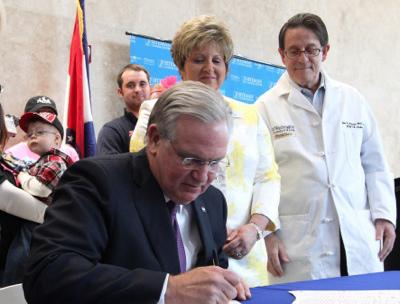
Dee Loflin, SMT Manager/Editor
“In every town across Missouri, you’ll find veterans who served during one of these conflicts in the Middle East,” Gov. Nixon said. “You’ll also find thousands of Missouri families who still have a loved one in uniform in Afghanistan or another country where our military serves. We have a responsibility to honor and respect their sacrifice, and I encourage Missourians to join me in thanking these veterans and their families for what they have done for our country and our state.”
As a member of the Council of Governors, Gov. Nixon has traveled twice to Iraq and three times to Kuwait and Afghanistan since 2009 (most recently in December 2012) to meet with U.S. military and civilian leaders in those countries and to visit with Missourians serving in the Missouri National Guard or the regular armed forces.
In January 2010, Gov. Nixon also launched the Show-Me Heroes initiative, which works with Missouri employers to give first consideration to military veterans when job openings occur. In the past four years, more than 3,500 Missouri employers have taken the Show-Me Heroes pledge, and more than 6,300 veterans have been hired by those businesses since those employers joined the program.

Dee Loflin, SMT Manager/Editor
“No Missourian battling cancer should have to break the bank in order to get the medicine they need,” Gov. Nixon said. “Passed with overwhelming bipartisan support, Senate Bill 668 will make sure insurance companies provide affordable coverage for these lifesaving medications, regardless of how a patient chooses to take them. I appreciate the hard work by members of the General Assembly, including Representative Solon, Senator Silvey and others, to get this bill to my desk and bring more affordable cancer treatment options to Missourians.”
Oral anticancer medications provide patients with a simpler, more convenient and less invasive alternative to chemotherapy delivered intravenously because these pills can be taken at home, often with fewer side effects. Currently, most insurance companies cover these drugs as part of a prescription drug benefit, rather than a medical benefit. As a result, cancer patients taking oral chemotherapy pills have faced significantly higher out-of-pocket costs than those who take their drugs intravenously.
Senate Bill 668 addresses this disparity by preventing insurance companies from treating out-of-pocket costs for chemotherapy pills differently than intravenous drugs. Health insurance companies can comply with the law by limiting the out-of-pocket costs they charge for anticancer medications taken orally to $75 for a thirty-day supply.
“With more and more oral chemotherapy pills coming on the market, this legislation was needed to ensure insurance companies cover these medications in an equitable way,” said Sen. Ryan Silvey (R-Kansas City). “Senate Bill 668 will bring Missouri in line with the majority of other states that have taken this common sense step to make sure Missourians with insurance have access to the cancer treatment option that’s best for them.”
“This legislation is about putting decisions about cancer care in the hands of doctors and patients, rather than insurance companies,” said Rep. Sheila Solon (R-Blue Springs). “Missourians struggling with cancer deserve the best, most effective treatment for their disease. I have been proud to work with my fellow legislators to get this common sense legislation passed, and I appreciate the Governor for signing it today.”
The bill, which is estimated to impact 1.6 million insured Missourians, received strong support from organizations including the American Cancer Society, the Leukemia & Lymphoma Society, and the Missouri Association of Osteopathic Physicians.
“As The Leukemia & Lymphoma Society and our partners in the community invest in research for cures, we want to ensure access to the best cancer treatments for every Missourian,” said Debbie Kersting, Executive Director of the Leukemia & Lymphoma Society – Gateway Chapter. “We applaud Governor Nixon and members of the General Assembly for their strong support of this bill, which will put affordable, effective cancer treatment within reach for Missourians across the state.”
“As the nation’s largest voluntary health organization dedicated to improving cancer care, the American Cancer Society believes all cancer patients should have access to the broad range of therapies needed to combat their disease,” said Stacy Reliford, Government Relations Director, American Cancer Society Cancer Action Network. “Oral chemotherapy is truly the wave of the future in cancer care and offers patients distinct advantages over traditional intravenous chemotherapy, including the fact that they are targeted therapies which attack only the cancer cells, leaving healthy cells alone. This lifesaving legislation will allow patients to use the most appropriate drug without being influenced by their out-of-pocket costs.”
An actuarial study commissioned by the legislature estimated that the legislation would have a negligible impact on insurance premiums.

Submitted by
Dee Loflin, SMT Manager/Editor
Missouri - As top soil has once again made itself visible, school closings have now returned to openings. Businesses and citizens have returned to regular hours and errands, and garden centers along with agriculture are preparing for folks to plant for the upcoming season. March winds typically blow the winter season out and allow the spring season to enter into the picture. To briefly outline, highlights of the House (fyi 2015) budget plans include.
$122 million general revenue increase to K-12 education with a prospected additional increase of $156 million in surplus revenues. $20 million additional dollars for the Access Missouri Scholarship Program. Nearly $7 million for the A+ program. A 3% multi-million dollar increase for funding to Missouri institutions of higher education and additional $10 million to provide equitable funding levels for Missouri community college system.
In the house we understand that education is an economic development tool compiled with a work ethic. Without the latter you only have an education. The need for advanced training and existing jobs along with the technology in creating new opportunities continues to grow.
We were excited this week to have a select group of 4th graders from Caruthersville visit. They were accompanied by teachers and parents. What a well mannered and respectful group they are. We are always thrilled to have visitors from the Bootheel in your Missouri capitol.

Submitted by
Dee Loflin, SMT Manager/Editor
This week, the Senate gave its final approval to my Senate Bill 530, advancing this important measure to the House of Representatives. This legislation provides incentives for parents whose children have been removed from their home because of their illegal drug use to seek out treatment in a timelier manner. My goal is to get drug-addicted parents the help they need to provide a safe, nurturing home for their children, or depending on their lack of commitment to a healthy family unit, not let their children languish in the foster care system. SB 530 changes how parental rights are terminated by adding to the circumstances under which a parent is considered unfit. Currently, children removed because of parental drug use averages 15 months before a Petition to Terminate Parental Rights (TPR) is ordered by the court. When drugs are involved, most parents continue to test positive for drugs. Federal and state law intends to secure the permanent placement of a child as quickly as possible, through TPR or guardianship. This legislation speeds up the process of TPR for those parents who are irresponsible and deemed unfit by the court. This bill shortens the timeline deemed necessary for family intervention performed by social workers, eliminating years of children languishing in foster care. As children age, their hopes and dreams of being adopted diminish.
History shows after one year of their children placed in state custody, less than 20 percent of these parents ordered into a drug treatment program actually enroll. Nationally, 75 percent of children who were removed because of parental drug abuse and placed in state custody, and later returned to the home for reunification, are returned back to state custody. This back and forth, plus months and years of uncertainty, is very difficult for these children.
Missouri now has more than 12,000 children in the foster system, at an annual expense of more than $52 million for foster home care. In the last 36 months, money spent for foster care has increased over 40 percent. This does not include the expense of legal representation, court costs, health care, and many other expenses borne by counties.
These children’s education is negatively affected when they are forced into moving in and out of different homes due to the lack of stability. This has to change, because children have rights, too! I look forward to my bill continuing through the legislative process as it moves to the House of Representatives. The Senate also began debate on legislation that would raise the cap on the amount of revenue bonds that may be issued and limit the use of funds to renovate existing state and public higher education buildings. Senate Bill 723 puts the process in place for deferred maintenance for buildings, which could be of help to Three Rivers College. We have an obligation as a state to take care of these buildings. This is a fundamental responsibility that has been pushed down the line for years. We must remember to keep focus on the safety of the individuals who work in these buildings, and protect some of our state's largest investments.
Recently in Poplar Bluff, concerned citizens living along West Hwy. 160 met regarding the safety of new road improvements now being planned for construction. In attendance were Rep. Steve Cookson, the Butler County Commission, Butler County Clerk Tonyi Deffendall, and MoDOT District Engineer Mark Shelton. Many good ideas were discussed regarding motorist and home-owners’ safety, and the price of their property they would receive for the right-of-way. I appreciated hearing the input from the citizens who are directly impacted.
Capitol Visitors
William "Wilson" McNeary IV of Charleston was among the selected students who visited Jefferson City this week to showcase their research during the University of Missouri Undergraduate Research Day at the Capitol. Mr. McNeary displayed his exciting research going on at the University of Missouri, which focuses on an issue he's passionate about: ensuring quality sanitation facilities for the world's population.
In addition, a lot of visitors from the 25th District made their way to the State Capitol this week, despite all the weather we had back home.
The Missouri Cattleman's Association met to discuss issues coming before the Senate Agriculture Committee.
I also met with Mississippi County Recorder of Deeds George Bays about different issues affecting our counties.
Jason Comfort and Zach Hedrick from Dexter, along with Ron Mattli from Wappapello, visited for the insurance agents' legislative advocacy day at the Capitol. Joetta Martin from Poplar Bluff also stopped by.
If you would like to read more about the legislation or committees mentioned in this column, visitwww.senate.mo.gov/libla. Thank you for the opportunity to serve you.

Submitted by
Dee Loflin, SMT Manager/Editor
As our world is divided on many items, one thing is for sure; we in the Bootheel of Missouri can all agree we have truly experienced winter. A week at a time of school closings, and a slow-down in the business environment, has been flet by many and made others home bound based on safety and accessibility concerns.
This last week in your Missouri house SB 668 which will make Missouri the 29th state to enact a law to ensure cancer patients have affordable access to life-saving oral chemotherapy medications. The Missouri House gave final approval this week to legislation that would eliminate the co-payment cost disparity that currently exists between orally and intravenously-administered chemotherapies.
Given the fact that orally-administered treatments are actually cheaper than those administered by IV, it is hard to rationalize how oral medications are far more costly for many patients here in Missouri. When you also factor in that many cancer treatments currently under development are oral in nature, it becomes even clearer that something must be done to ensure access to these treatments. The bill we passed this week will bring insurance coverage parity to both forms of chemotherapy – intravenous (IV) and pill form – by simply requiring plans that already cover traditional chemotherapies to also cover oral chemotherapy products.
This is a simple change that will have a huge impact on the lives of Missourians battling cancer who want nothing more than affordable access to these life-saving treatment options. We also know the requirement will not cause the cost of insurance premiums to increase significantly based on an actuarial study that was done.
The bill now moves to the governor’s desk where it will become law with his signature.
One of the bills approved by the House this week, HB 2014, would provide much-needed funding to our public education system. The supplemental budget bill addresses some of the funding shortfalls for various state services so that these programs can make it through the end of the fiscal year with adequate appropriations. While supplemental budget bills aren’t always necessary, lower-than-expected revenues from the tax our state has on casinos has contributed to the need to shore up funding for our K-12 education system.
The bill we approved would dedicate another $22 million in funding for the foundation formula that provides basic state aid to our schools. The bill also includes a $5 million payment to the Normandy School District. As you may know, the district is currently unaccredited and teetering on the edge of insolvency because of a state law that requires the district to pay for students who transfer to neighboring districts. The additional funds will help the district to make it through the school year.
The bill now moves to the Senate for consideration.
Missouri’s System of Education to Receive Funding Boost under Spending Plan Introduced by House Budget Chairman Rick Stream
Also this week, House Budget Chairman Rick Stream unveiled a proposed spending plan that would take funding for K-12 education to record levels, provide a significant funding boost to all public universities and community colleges, and dramatically increase financial assistance to Missouri students who seek a college education in the state.
The spending plan introduced in the House includes a $278 million increase for the school foundation formula, which would make the K-12 education budget the largest in state history. Under the plan, $122 million of the increase would come from General Revenue with another $156 million from a Surplus Revenue Fund that will be created to hold any revenues above the estimates agreed upon by the House and Senate. Monies placed in the fund would have to be used for education and one-time projects.
The plan also calls for a 2 percent increase in core funding for every public university and community college in the state, and another $10 million in equity funding for community colleges. In addition, it includes approximately $63 million in funding for the backlog of capital improvement projects at higher education institutions around the state.
The House Budget Committee is expected to consider the appropriations bills this week and next. The goal is to have the bills to the House floor for discussion the week after the Legislative Spring Break, which runs from Mar. 13 – 24.
As we have moved our clocks forward for day light savings time, our thoughts about outdoor activities increases with anticipation. Start out slow, think of your body as an engine, it needs to warm up before getting up to speed.
As always, it is an honor to serve you in the Missouri House. If you would like to discuss any issue, please call 573-751-3629. You can also email me at kent.hampton@house.mo.gov . I look forward to hearing from you.

